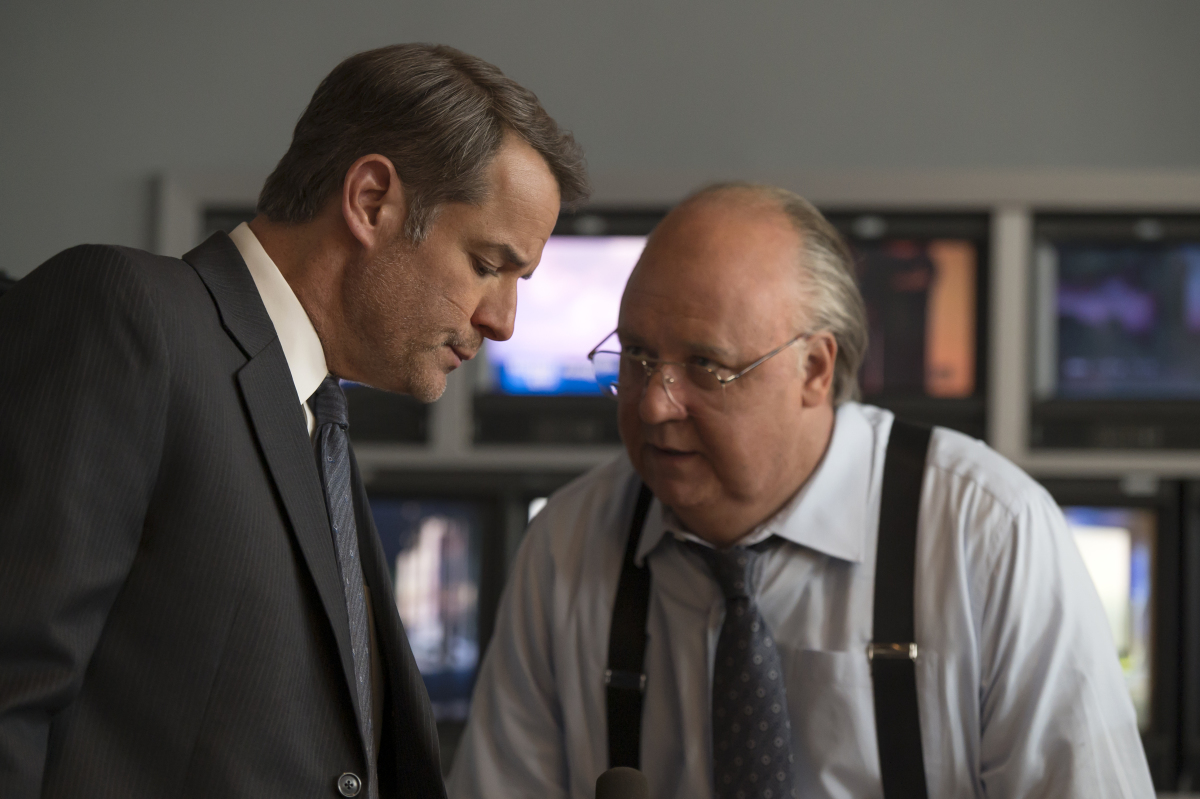He had the loudest voice, the bulkiest body, the most relentless mind.
It shouldn’t surprise us, then, that Roger Ailes dominated television … then dominated American life.
Now a powerhouse Showtime mini-series — “The Loudest Voice” – captures that. Russell Crowe(shown here, right, with Josh Stamberg) vividly depicts the late Ailes as a man of volume and venom and (when needed) subtlety.
We see the subtle part first, as Ailes is being dumped from his job as head of NBC’s cable channels – CNBC and America’s Talking, the predecessor of MSNBC. (There’s no explanation why, other than that Human Resources insisted he go. Other sources, however, say Ailes fought with other NBC executives and was also being probed for an alleged anti-Semitic comment.)
In this case, we get the gentle Ailes, begging Jack Welch – head of General Electric, which owned NBC – for a favor. Welch was already giving him a big-bucks exit package, in exchange for a “non-compete” clause. Now Ailes begged to have it merely list the existing networks he couldn’t work for.
He had a scheme, of course: He already planned to create a new one, the Fox News Channel.
The channel’s birth was rushed and hectic, “Loudest Voice” says. Sean Hannity wobbled during rehearsals; during a pet segment, the director failed to switch cameras after a dog left a deposit.
But overall, Ailes knew where he was going: Most of cable was still in the satisfy-everyone mode. This new cable world, he knew, was about grabbing and holding a specific audience.
That approach works in different ways: For the premium networks (starting with HBO) and one basic-cable network (FX) and the streaming services, it means doing fewer and classier shows, with smart scripts and cinematic approaches. For Fox News, it means aiming for conservatives.
The strategy worked well … especially five years later. That’s when the second episode is set. The attack on Sept. 11, 2001, leaves Ailes stunned – and then whirling into action. He soon gets a call from Karl Rove, in George W. Bush’s White House. Fox will be the war network.
That’s a potent hour, beautifully crafted, and the third one shifts mood. Barack Obama is ahead in the polls and Ailes is furious. He hires detectives to do secret investigations. When Rupert Murdoch, the Fox owner, semi-muzzles him, he blames Murdoch’s wife (a native of China) for her global views … and investigates her, too.
This is a fascinating portrait, perfectly molded by Crowe. We see a man so crazed that he calls his executives in for a 4 a.m. rant. We see the start of the sexual abuse that would bring him down. We see someone who insisted on being the smartest man in the room … and probably was.
Late in the third episode, he visits his crumbling hometown of Warren, Ohio. There, he berates foreigners for taking away jobs; he insists we make America great again.
Now, if he could only get a candidate to say those things.
— “The Loudest Voice,” 10 p.m. Sundays, Showtime, repeating often
— Opener, June 30, sees the start of Fox News. Second hour, July 7, has the Sept. 11 attack; third, July 14, has Barack Obama’s election
